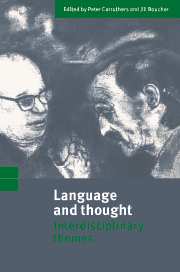Book contents
- Frontmatter
- Contents
- List of contributors
- Preface
- 1 Introduction: opening up options
- Part I Language, development and evolution
- Part II Language, reasoning and concepts
- Part III Language and conscious reasoning
- Introduction to part III
- 11 Language, thought and the language of thought (Aunty's own argument revisited)
- 12 Natural language and virtual belief
- 13 The meta-intentional nature of executive functions and theory of mind
- 14 Reflections on language and mind
- References
- Author index
- Subject index
14 - Reflections on language and mind
Published online by Cambridge University Press: 08 January 2010
- Frontmatter
- Contents
- List of contributors
- Preface
- 1 Introduction: opening up options
- Part I Language, development and evolution
- Part II Language, reasoning and concepts
- Part III Language and conscious reasoning
- Introduction to part III
- 11 Language, thought and the language of thought (Aunty's own argument revisited)
- 12 Natural language and virtual belief
- 13 The meta-intentional nature of executive functions and theory of mind
- 14 Reflections on language and mind
- References
- Author index
- Subject index
Summary
A seductive bad idea: central processing
A theme that emerged at the Sheffield Conference with particular force, to my way of thinking, was a new way of recognising, and then avoiding, a seductive bad idea. One of its many guises is what I have called the Cartesian Theatre, but it also appears in the roles of Central Processing, or Central Executive, or Norman and Shallice's SAS, or Fodor's non-modular central arena of belief fixation. What is wrong with this idea is not (Just) that it (apparently) postulates an anatomically discernible central region of the brain – maximally non-peripheral, one might say – but that it supposes that there is a functionally identifiable subsystem (however located or even distributed in the brain) that has some all too remarkable competencies achieved by some all too remarkable means. There are many routes to it. Here is one that starts off in an excellent direction but then veers off. The mistaken fork is not explicitly endorsed by anybody that I can think of, but I daresay it has covertly influenced a lot of thinking on the topic.
(a) One of the things we human beings do is talk to others.
(b) Another is that we talk to ourselves – out loud.
(c) A refinement of (b) is to talk silently to oneself, but still in the words of a natural language, often with tone of voice and timing still intact. (One can often answer such questions as this: Are you thinking in English or French as you work on this problem?')
So far, so good, but watch out for the next step:
[…]
- Type
- Chapter
- Information
- Language and ThoughtInterdisciplinary Themes, pp. 284 - 294Publisher: Cambridge University PressPrint publication year: 1998
- 13
- Cited by

